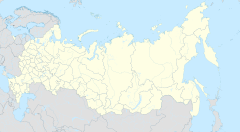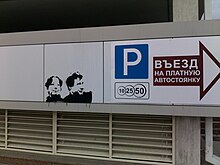
Novaya Gazeta, now Novaya Gazeta Europe, is a Latvia-based independent Russian newspaper. It relocated to Riga, Latvia, following Russia's invasion of Ukraine in 2022. It is known for its critical and investigative coverage of Russian political and social affairs, the horrors of the Chechen war, corruption among the ruling elite, and increasing authoritarianism in Russia. It was formerly published in Moscow until shortly after the war began, in regions within Russia, and in some foreign countries. The print edition is published on Mondays, Wednesdays, and Fridays; English-language articles on the website are published on a weekly basis in the form of the Russia, Explained newsletter. As of 2023, the newspaper had a daily print circulation of 108,000, and online visits of 613,000.

Yuri Dmitrievich Budanov was a Russian military officer convicted for the kidnapping and murder of Elza Kungayeva in Chechnya.

Anna Stepanovna Politkovskaya was an American-Russian journalist and human rights activist, who reported on political and social events in Russia, in particular, the Second Chechen War (1999–2005).

Leonid Igorevich Markelov is a Russian politician and lawyer, who is the former head of the Mari El republic in Russia. He took office on January 14, 2001 and resigned from office on April 6, 2017. Markelov was later arrested under suspicion of accepting bribes.
Racism in Russia mainly appears in the form of negative attitudes towards non-ethnic Russian citizens, immigrants or tourists and negative actions against them by some Russians. Traditionally, Russian racism includes antisemitism and Tatarophobia, as well as hostility towards the various peoples of the Caucasus, Central Asia, East Asia and Africa.
Elza Kungayeva was a Chechen 18-year-old woman abducted, beaten, allegedly raped, and murdered by Russian Army Colonel Yuri Budanov during the Second Chechen War.
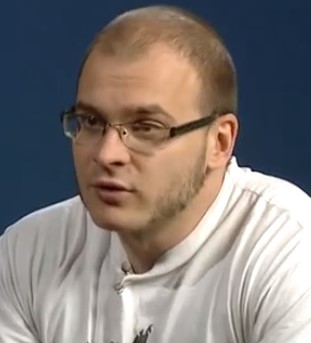
Maxim Sergeyevich Martsinkevich, better known as Tesak, was a Russian neo-Nazi activist, media personality, vlogger, and the leader and co-founder of the Restruct movement which manifested in post-Soviet countries.
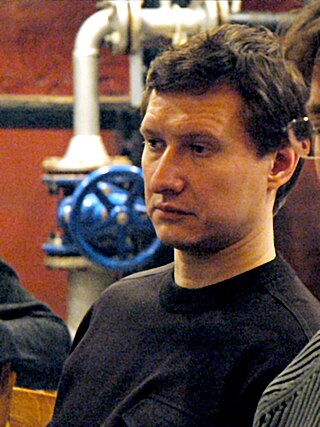
Stanislav Yuryevich Markelov was a Russian human rights lawyer. He participated in a number of publicized cases, including those of left-wing political activists and antifascists persecuted since the 1990s, as well as journalists and victims of police violence.

Anastasia Baburova was a journalist for Novaya Gazeta and a student of journalism at Moscow State University. She was born in Sevastopol, Ukrainian SSR. A member of Autonomous Action, she investigated the activities of neo-Nazi groups. She was shot and killed together with human rights lawyer Stanislav Markelov.
The Center for Journalism in Extreme Situations is a press advocacy group in Russia. Founded in 2000 as part of the Russian Union of Journalists, the center is the primary media watchdog in the country and produces a variety of publications, including the weekly bulletin of media news and commentary Dangerous Profession.
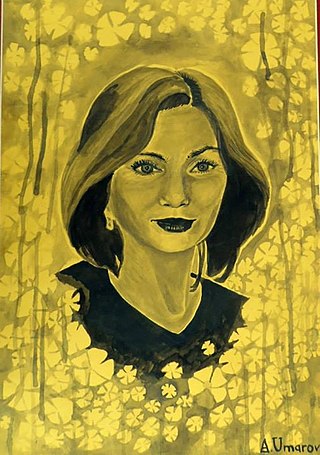
Natalya Khusainovna Estemirova was a Russian human rights activist and board member of the Russian human rights organization Memorial. Estemirova was abducted by unknown persons on 15 July 2009 around 8:30 a.m. from her home in Grozny, Chechnya, as she was working on "extremely sensitive" cases of human rights abuses in Chechnya. Two witnesses reported they saw Estemirova being pushed into a car shouting that she was being abducted. Her remains were found with bullet wounds in the head and chest area at 4:30 p.m. in woodland 100 metres (330 ft) away from the federal road "Kavkaz" near the village of Gazi-Yurt, Ingushetia.
Events in the year 2011 in Russia.
Igor Domnikov was a Russian journalist and editor for special topics involving business corruption for Novaya Gazeta in Moscow, Russia, who was murdered in 2000. Although some individuals were convicted of the attack in 2007, the suspected mastermind, Sergey Dorovsky, an ex-government official from Lipetsk Region, was never convicted as the statute of limitations on the case had expired.
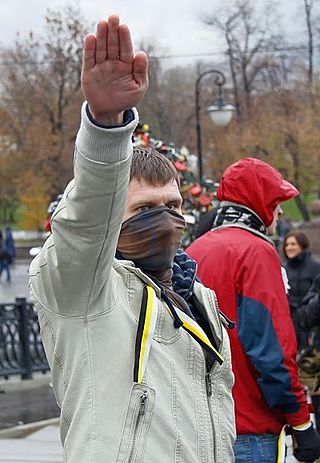
Neo-Nazism in Russia is a far-right political and militant movement in Russia. Emerging during the late Soviet era and early 1990s from white power skinheads and football hooligans, neo-Nazism in Russia has become known for a series of violent attacks and murders targeting Central Asian and Caucasian migrants. Videos of these attacks have been uploaded onto the internet by members of neo-Nazi or skinhead gangs, leading to international outcry and an eventual crackdown in the late 2000s and early 2010s.

The All-Russian Public Patriotic Movement «Russian National Unity» was a Russian unregistered nationalist paramilitary organization that existed in 2000–2013 as a result of the split of the previously united organization Russian National Unity (1990). It was managed by a council of regional commanders. The organization was a member of the World Union of National Socialists.

Dmitry Anatolyevich Steshin is a Russian journalist and editor who works for the Komsomolskaya Pravda newspaper and for his own Telegram channel.
The Battle Organization of Russian Nationalists or the Combat Organization of Russian Nationalists, often abbreviated as BORN, was a Russian neo-Nazi group based out of Moscow. Members were accused of a series of murders and attempted murders, leading to the deaths of at least ten people.
In contemporary Russia, the far-right scene spans a wide spectrum of political groups, authors, activists, political movements, skinhead subcultures and intellectual circles. The mainstream radical right that is allowed or supported by the government to participate in official mass media and public life includes parties such as the Liberal Democratic Party of Russia (LDPR) and Rodina as well as far-right political thinkers such as Aleksandr Dugin and Lev Gumilev. Other actors of Russia's far right include skinheads and political movements like the Movement Against Illegal Immigration and contemporary successors of the Pamyat organization.
Managed nationalism or controlled nationalism is a term used by some academics to refer to an informal policy of pragmatic collaboration with Russian nationalist and neo-Nazis pursued by the government of Russia under Vladimir Putin. Beginning after Putin's election as President of Russia in 2000 and escalating after the 2004 Orange Revolution in Ukraine, managed nationalism led to the promotion of the Russian Image organisation throughout the late 2000s until the 2009 murders of human rights activists Stanislav Markelov and Anastasia Baburova, at which point Russian Image was dissolved.


